八年级上英语比较级最高级
英语八年级上册第二单元重要语法点

英语八年级上册第二单元重要语法点以下是八年级上册英语第二单元的重要语法点:1. 形容词和副词的比较级和最高级- 比较级:一般在形容词或副词后面加上"-er" 即可,例如"taller"、"quicker"。
- 最高级:一般在形容词或副词后面加上"-est" 即可,例如"tallest"、"quickest"。
- 注意:有些形容词和副词的比较级和最高级不规则,需要单独记忆,例如"good/better/best"。
2. 用"than" 表示比较- 基本句型:A + be/do + 比较级+ than + B,例如"I am taller than you."。
- 可以使用"not as/so + 比较级+ as" 表示"A不如B",例如"He is not as tall as his brother."。
3. 用"the same as" 表示相似- 基本句型:A + be + the same as + B,例如"Their houses are the same as ours."。
4. 用"in" 表示时间或地点- 在时间方面,"in" 表示在某个时间段内,例如"in the morning"、"in 2023"。
- 在地点方面,"in" 表示在某个位置范围内,例如"inBeijing"、"in the school"。
5. 用"on" 表示时间或地点- 在时间方面,"on" 表示在某个具体日期或时间点上,例如"on Monday"、"on my birthday"。
八年级上册英语形容词副词的比较级与最高级

形容词副词的比较级与最高级基础过关一、比较级的定义:大多数的形容词都有三个级别:原级、比较级、最高级。
其中比较级表示“更……”,用于两者之间的比较,用来说明“前者比后者更……”,比较级前面一般用much, even, a little修饰,其中even, much 只能修饰比较级。
比较级的构成:比较级和最高级的构成1)加-er,-est构成比较级和最高级。
单音节形容词和副词以不发音的-e结尾的High higher highest safe safer safest Hard harder hardest late later latest small----smaller----smallest large----larger----largestnew----newer----newest nice----nicer----nicest辅音字母要双写的情况以辅音加-y结尾的情况Big bigger biggest dry drier driest Hot hotter hottest merry merrier merriest Thin thinner thinnest easy easier easiest 1. 写出以下各形容词的比较级和最高级:1. nice ______________________2. fat ____________________3. slow _____________________4. dry ____________________5. happy ____________________6. wet ____________________7. thin ______________________ 8. far ____________________9. early _____________________ 10. careful_________________15. exciting ___________________ 16. busy __________________2. 根据句意,用所括号内所级形容词的比较等级形式填空:1. Mr. Smith is man in this office. (rich)2. Winter is season of the years. (cold)3. This radio is not so as that one. (cheap)4. It is much today than yesterday. (hot)5. She is a little than her classmates. (careful)6. people came to the meeting than last time. (many)7. Which book is , this one or that one? (easy)8. My room is than yours. (small)9. Hainan is from Beijing than Hunan. (far)10. Skating is than swimming. (exciting)11. Jim is than all the others. (honest)12. The higher you climb, the it will be. (cold)13.There are boys than girls in our class. (few)2) 加more, most构成比较级和最高级多音节的形容词由形容词加-ly构成的副词expensive more expensive most expensive slowly more slowly most slowly carefully more carefully most carefully highly more highly most highly 以-ful,-less,-able,-ous,-ive, -ing等结尾的双元音形容词useless more useless most uselessserious more serious most serious分词形容词tired,pleased及glad,often,real, right,wrong等单音节形容词。
八年级上册英语比较级和最高级
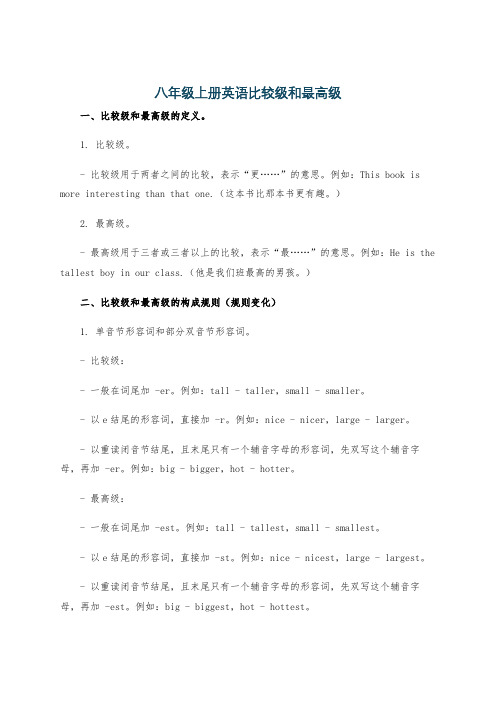
八年级上册英语比较级和最高级一、比较级和最高级的定义。
1. 比较级。
- 比较级用于两者之间的比较,表示“更……”的意思。
例如:This book is more interesting than that one.(这本书比那本书更有趣。
)2. 最高级。
- 最高级用于三者或三者以上的比较,表示“最……”的意思。
例如:He is the tallest boy in our class.(他是我们班最高的男孩。
)二、比较级和最高级的构成规则(规则变化)1. 单音节形容词和部分双音节形容词。
- 比较级:- 一般在词尾加 -er。
例如:tall - taller,small - smaller。
- 以e结尾的形容词,直接加 -r。
例如:nice - nicer,large - larger。
- 以重读闭音节结尾,且末尾只有一个辅音字母的形容词,先双写这个辅音字母,再加 -er。
例如:big - bigger,hot - hotter。
- 最高级:- 一般在词尾加 -est。
例如:tall - tallest,small - smallest。
- 以e结尾的形容词,直接加 -st。
例如:nice - nicest,large - largest。
- 以重读闭音节结尾,且末尾只有一个辅音字母的形容词,先双写这个辅音字母,再加 -est。
例如:big - biggest,hot - hottest。
2. 多音节形容词和部分双音节形容词。
- 比较级:在形容词前面加more。
例如:beautiful - more beautiful,interesting - more interesting。
- 最高级:在形容词前面加most。
例如:beautiful - most beautiful,interesting - most interesting。
三、不规则变化的形容词比较级和最高级。
1. good/well - better - best(好的)2. bad/badly - worse - worst(坏的;糟糕地)3. many/much - more - most(许多)4. little - less - least(少的)5. far - farther/further - farthest/furthest(远的;进一步的)四、比较级和最高级的用法。
人教版八年级英语比较级和最高级的用法总结

比较级和最高级用法总结一、形容词、副词的比较级和最高级的构成规则1. 一般单音节词和少数以-er,-ow结尾的双音节词,比较级在后面加-er,最高级在后面加-est;(1) 单音节词如:small→smaller→smallest short→shorter→shortest tall→taller→tallest great→greater→greatest(2) 双音节词如:clever→cleverer→cleverest narrow→narrower→narrowest2. 以不发音e结尾的单音节词,比较在原级后加-r,最高级在原级后加-st;如:large→larger→largest nice→nicer→nicest able→abler→ablest3. 在重读闭音节(即:辅音+元音+辅音)中,先双写末尾的辅音字母,比较级加-er,最高级加-est;如:big→bigger→biggest hot→hotter→hottest fat→fatter→fattest4. 以“辅音字母+y”结尾的双音节词,把y改为i,比较级加-er,最高级加-est;如:easy→easier→easiest heavy→heavier→heaviest busy→busier→busiest happy→happier→happiest5. 其他双音节词和多音节词,比较级在前面加more,最高级在前面加most;如:beautiful→more beautiful→most beautifuldifferent→more different→most differenteasily→more easily→most easily注意:①形容词最高级前通常必须用定冠词the,副词最高级前可不用。
例句:The Sahara is the biggest desert in the world.②形容词most前面没有the,不表示最高级的含义,只表示"非常"。
八年级上册英语书75页3a知识点

八年级上册英语书75页3a知识点在八年级上册英语书第75页的3a部分中,我们将学到一些非常重要的知识点。
本文将围绕这些知识点展开讲解,帮助大家更好地掌握英语学习中的要点。
1. 形容词与副词的比较级和最高级形容词和副词的比较级和最高级是英语学习中非常重要的一部分内容。
比较级用来比较两个事物的差异,最高级则是用来表示某个事物在所有同类事物中的最高程度。
比如:形容词比较级:bigger(更大的);形容词最高级:biggest(最大的)副词比较级:faster(更快的);副词最高级:fastest(最快的)我们需要掌握这些词语的用法,并理解其中的语法规则,才能更好地应用于日常的英语学习中。
2. 反意疑问句反意疑问句是一个极为常见的语法结构,用于在说话者询问对方时加强语气。
例如:It's cold outside, isn't it?(外面很冷,对吧?)在这种语法结构中,疑问部分的形式和肯定/否定的陈述部分相反,同时需要注意主语和动词的一致性。
3. 情态动词情态动词是用于表达一种态度或意愿的动词,例如may(可能)、can(能够)和should(应该)等。
这种动词在英语语法和用法中具有特殊的地位,需要我们仔细学习和掌握。
4. 非谓语动词非谓语动词是指独立于谓语动词的动词形式,常见的有不定式、动名词和分词等。
在句子中,非谓语动词可以充当多种语法角色,例如主语、宾语、定语和状语等。
需要注意的是,不同的非谓语动词在使用时也有不同的用法和语法规则。
5. 名词性从句名词性从句常用于表示内容的从句,例如在句子中作主语、宾语或表语等。
需要注意的是,名词性从句的语序和语法结构可能与主句不同,需要我们仔细理解和掌握。
以上就是八年级上册英语书75页3a部分的重点知识点。
希望大家能够充分掌握这些内容,在英语学习中更上一层楼。
(完整版)八上英语常见及各类型形容词比较级最高级总结
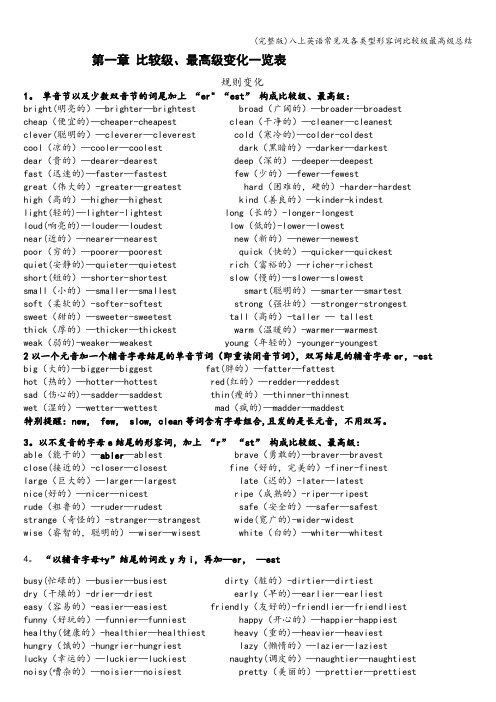
第一章比较级、最高级变化一览表规则变化1。
单音节以及少数双音节的词尾加上“er" “est”构成比较级、最高级:bright(明亮的)—brighter—brightest broad(广阔的)—broader—broadestcheap(便宜的)—cheaper-cheapest clean(干净的)—cleaner—cleanest clever(聪明的)—cleverer—cleverest cold(寒冷的)—colder-coldestcool(凉的)—cooler—coolest dark(黑暗的)—darker—darkestdear(贵的)—dearer-dearest deep(深的)—deeper—deepestfast(迅速的)—faster—fastest few(少的)—fewer—fewestgreat(伟大的)-greater—greatest hard(困难的,硬的)-harder-hardesthigh(高的)—higher—highest kind(善良的)—kinder-kindestlight(轻的)—lighter-lightest long(长的)-longer-longestloud(响亮的)—louder—loudest low(低的)-lower—lowestnear(近的)—nearer—nearest new(新的)—newer—newestpoor(穷的)—poorer—poorest quick(快的)—quicker—quickestquiet(安静的)—quieter—quietest rich(富裕的)—richer-richestshort(短的)—shorter-shortest slow(慢的)—slower—slowestsmall(小的)—smaller—smallest smart(聪明的)—smarter—smartestsoft(柔软的)-softer-softest strong(强壮的)—stronger-strongestsweet(甜的)—sweeter-sweetest tall(高的)-taller — tallest thick(厚的)—thicker—thickest warm(温暖的)-warmer—warmestweak(弱的)-weaker—weakest young(年轻的)-younger-youngest2以一个元音加一个辅音字母结尾的单音节词(即重读闭音节词),双写结尾的辅音字母er,-est big(大的)—bigger—biggest fat(胖的)—fatter—fattesthot(热的)—hotter—hottest red(红的)—redder—reddestsad(伤心的)—sadder—saddest thin(瘦的)—thinner-thinnestwet(湿的)—wetter—wettest mad(疯的)—madder—maddest特别提醒:new, few, slow, clean等词含有字母组合,且发的是长元音,不用双写。
人教版英语八年级上册 比较级最高级归纳
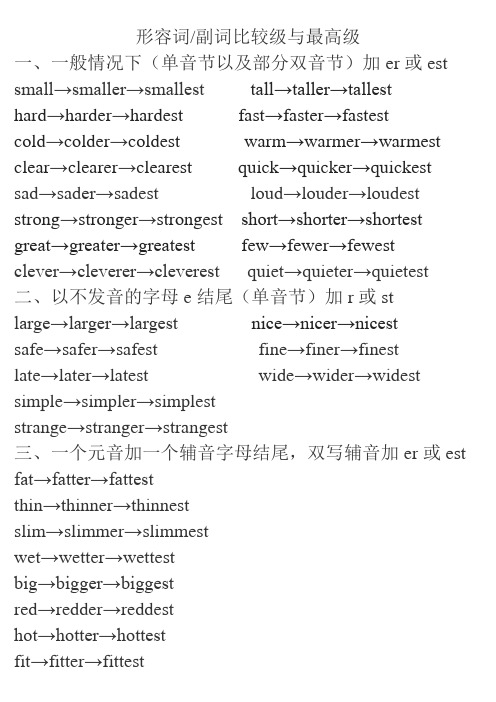
quietly→morequietly→mostquietly
loudly→moreloudly→mostloudly
slowly→moreslowly→mostslowly
quickly→morequickly→mostquickly
sadly→moresadly→mostsadly
happily→morehappily→mosthappily
carefully→morecarefully→mostcarefully
serious→moreserious→mostserious
similar→moresimilar→most similar
lovely→lovelier→loveliest friendly→friendlier→friendliest
五、双音节以及多音节词前加more或most
outgoing→moreoutgoing→mostoutgoing
beautiful→more beautiful→most beautiful
big→bigger→biggest
red→redder→reddest
hot→hotter→hottest
fit→fitter→fittest
四、辅音字母加y结尾,变y为i加er或est
easy→easier→easiestangry→angrier→angriest
busy→busier→busiestheavy→heavier→heaviest
terrible→moreterrible→most terrible
delicious→moredelicious→most delicious
八年级上册英语u2T1知识点

八年级上册英语u2T1知识点八年级上英语第二单元第一课时知识点在八年级上英语第二单元第一课时中,我们学习了关于比较级和最高级的知识点。
在此篇文章中,我们将详细介绍这些知识点,让大家更好的掌握。
一、比较级比较级的用法:1.用于两个人或物之间的比较,表示一个人或物在某方面较另一个强或优越。
例如:Tom is taller than Jack. (汤姆比杰克高。
)2.两个人或物之间的比较,常用 than 连接。
例如:A bike is faster than a bus. (自行车比公共汽车快。
)3.比较级的构成规则:单音节词和少数双音节词比较级与原级相加“-er”。
例如:tall(高)- taller(更高)fast(快)- faster(更快)big(大)- bigger(更大)4.以字母“e”结尾的单词直接加“r”。
例如:fine(美好的)- finer(更美好的)large(大的)- larger(更大的)5.以辅音字母加“y”结尾的双音节词,先改“y”为“i”,再加“er”。
例如:happy(快乐的)- happier(更快乐的)busy(忙碌的)- busier(更忙碌的)6.多音节词和部分双音节词用 more +原级。
例如:interesting(有趣的)- more interesting(更有趣的)important(重要的)- more important(更重要的)7.不规则变化的比较级。
例如:good(好的)- better (更好的)bad(坏的)- worse(更坏的)far(远的)- farther/further(更远的)二、最高级最高级的用法:1.三个或三个以上的人或物之间的比较。
例如:Tom is the tallest in his class. (汤姆是班上最高的。
)2.当某一事物在同一类事物中处于最高级时,最高级也可用于两个人或物之间的比较。
例如:It is the best film I have ever seen. (这是我看过的最好的电影。
八年级英语上形容词比较级最高级

八年级英语上形容词比较级最高级形容词,副词的比较级、最高级变化规则.一般在词尾直接加er或est,例如,tall-taller-tallest,long-longer-longest2.以不发音的字母e结尾的单词在词尾直接加r或st,例如,nice-nicer-nicest3.以辅音字母+y结尾的词,把y变为i,再加er或est,例如,heavy-heavier-heaviest4.重读闭音节,末尾只有一个辅音字母,双写这个辅音字母,再加er或est,例如,big-bigger-biggest fat thin red wet5.部分双音节词和多音节词分别在原级前加more构成比较级和most构成最高级,例如,slowly-more slowly-most slowly;beautiful-more beautiful-most beautiful ( tired often )二、不规则变化原级比较级最高级good/well better bestmany/much more mostbad/ill/badly worse worstlittle less leastold older/elder oldest/eldestfar farther/further farthest/furthestⅣ形容词,副词等级的用法一、原级的用法1.只能修饰原级的词,very,quite,so,too例如,He is___________to walk on.他太累了以至于不能再继续走了。
My brother runs _______________I can?t follow him.我弟弟跑得那么快以至于我跟不上他。
2.原级常用的句型结构(1)―甲+动词+(倍数)+as+形容词原级+as+乙‖表示―甲和乙程度相同‖或―甲是乙的几倍‖例如,汤姆和凯特年龄一样大。
______________________________________________ 汤姆和迈克跑得一样快。
人教版八年级上册英语第三单元语法

人教版八年级上册英语第三单元语法一、形容词比较级和最高级的构成。
1. 规则变化。
- 一般在词尾加 -er构成比较级,加 -est构成最高级。
- 例如:tall - taller - tallest;long - longer - longest。
- 以字母e结尾的形容词,加 -r构成比较级,加 -st构成最高级。
- 例如:nice - nicer - nicest;large - larger - largest。
- 以重读闭音节结尾,且末尾只有一个辅音字母的形容词,双写这个辅音字母,再加 -er构成比较级,加 -est构成最高级。
- 例如:big - bigger - biggest;hot - hotter - hottest。
- 以“辅音字母 + y”结尾的形容词,把y变为i,再加 -er构成比较级,加 -est构成最高级。
- 例如:heavy - heavier - heaviest;funny - funnier - funniest。
2. 不规则变化。
- 一些常见的不规则形容词比较级和最高级形式:- good/well - better - best.- bad/badly - worse - worst.- many/much - more - most.- little - less - least.- far - farther/further - farthest/furthest(farther表示距离更远;further表示程度上更进一步)二、形容词比较级和最高级的用法。
1. 比较级的用法。
- 两者比较。
- 比较级用于两者之间的比较,表示“更……”。
常用结构为“A+be+比较级+than + B”。
- 例如:My sister is taller than me.(我的姐姐比我高。
)- 也可以使用“比较级+and+比较级”表示“越来越……”。
- 例如:It is getting colder and colder.(天气变得越来越冷了。
八上英语知识点

八年级英语上册语法知识点1. 形容词/副词的比较级和最高级的构成规则(1)单音节词和少数以-er,-ow结尾的双音节单词,比较级在后面加-er,最高级在后面加-est。
①单音节单词small→smaller→smallestshort→shorter→shortesttall→taller→tallestgreat→greater→greatest②少数以-er,-ow结尾的双音节单词clever→cleverer→cleverestnarrow→narrower→narrowest(2)以不发音e结尾的单音节单词,比较级在原形后加-r,最高级在原级后加-st。
large→larger→largestnice→nicer→nicestable→abler→ablest(3)以一个辅音字母结尾的闭音节(即:辅音+元音+辅音)单词中,先双写末尾的辅音字母,比较级加-er,最高级加-est。
big→bigger→biggesthot→hotter→hottestfat→fatter→fattest(4)以“辅音字母+y”结尾的双音节词,把y改为i,比较级加-er,最高级加-est。
easy→easier→easiestheavy→heavier→heaviestbusy→busier→busiesthappy→happier→happiest(5)其他双音节词和多音节词,比较级在前面加more,最高级在前面加most。
beautiful→more beautiful→most beautifuldifferent→more different→most differenteasily→more easily→most easily(6)有少数形容词、副词的比较级和最高级是不规则的,必须熟记。
good→better→bestwell→better→bestbad→worse→worstill→worse→worstold→older/elder→oldest/eldestmany/much→more→mostlittle→less→leastfar →further/farther→furthest/farthest2. 形容词和副词比较级的用法(1)“甲+be+(倍数)+形容词比较级+than+乙”表示“甲比乙…”或“甲比乙…几倍”。
(完整版)八上英语常见及各类型形容词比较级最高级总结

第一章比较级、最高级变化一览表规则变化1.单音节以及少数双音节的词尾加上“er”“est”构成比较级、最高级:bright(明亮的)—brighter—brightest broad(广阔的)—broader—broadestcheap(便宜的)—cheaper—cheapest clean(干净的)—cleaner—cleanest clever(聪明的)—cleverer—cleverest cold(寒冷的)—colder—coldestcool(凉的)—cooler—coolest dark(黑暗的)—darker—darkestdear(贵的)—dearer—dearest deep(深的)—deeper—deepestfast(迅速的)—faster—fastest few(少的)—fewer—fewestgreat(伟大的)—greater—greatest hard(困难的,硬的)—harder—hardesthigh(高的)—higher—highest kind(善良的)—kinder—kindestlight(轻的)—lighter—lightest long(长的)—longer—longestloud(响亮的)—louder—loudest low(低的)—lower—lowestnear(近的)—nearer—nearest new(新的)—newer—newestpoor(穷的)—poorer—poorest quick(快的)—quicker—quickestquiet(安静的)—quieter—quietest rich(富裕的)—richer—richestshort(短的)—shorter—shortest slow(慢的)—slower—slowestsmall(小的)—smaller—smallest smart(聪明的)—smarter—smartestsoft(柔软的)—softer—softest strong(强壮的)—stronger—strongestsweet(甜的)—sweeter—sweetest tall(高的)-taller - tallest thick(厚的)—thicker—thickest warm(温暖的)—warmer—warmestweak(弱的)—weaker—weakest young(年轻的)—younger—youngest2以一个元音加一个辅音字母结尾的单音节词(即重读闭音节词),双写结尾的辅音字母er,-estbig(大的)—bigger—biggest fat(胖的)—fatter—fattesthot(热的)—hotter—hottest red(红的)—redder—reddestsad(伤心的)—sadder—saddest thin(瘦的)—thinner—thinnestwet(湿的)—wetter—wettest mad(疯的)—madder—maddest特别提醒:new, few, slow, clean等词含有字母组合,且发的是长元音,不用双写。
(word完整版)八年级英语上形容词比较级最高级
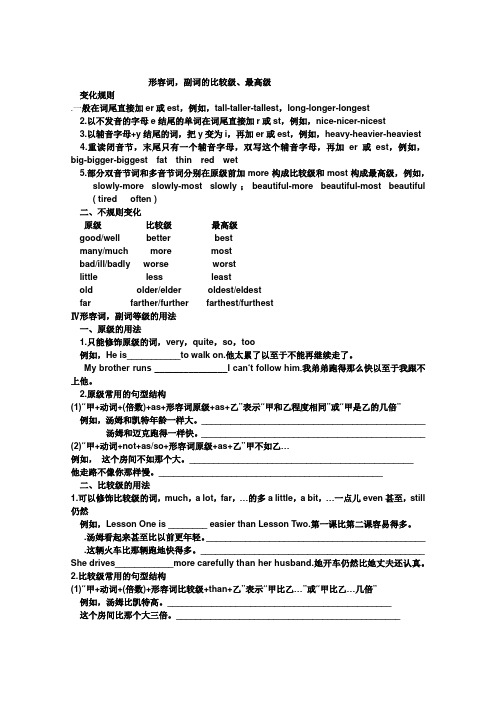
形容词,副词的比较级、最高级变化规则.一般在词尾直接加er或est,例如,tall-taller-tallest,long-longer-longest2.以不发音的字母e结尾的单词在词尾直接加r或st,例如,nice-nicer-nicest3.以辅音字母+y结尾的词,把y变为i,再加er或est,例如,heavy-heavier-heaviest4.重读闭音节,末尾只有一个辅音字母,双写这个辅音字母,再加er或est,例如,big-bigger-biggest fat thin red wet5.部分双音节词和多音节词分别在原级前加more构成比较级和most构成最高级,例如,slowly-more slowly-most slowly;beautiful-more beautiful-most beautiful ( tired often )二、不规则变化原级比较级最高级good/well better bestmany/much more mostbad/ill/badly worse worstlittle less leastold older/elder oldest/eldestfar farther/further farthest/furthestⅣ形容词,副词等级的用法一、原级的用法1.只能修饰原级的词,very,quite,so,too例如,He is___________to walk on.他太累了以至于不能再继续走了。
My brother runs _______________I can‘t follow him.我弟弟跑得那么快以至于我跟不上他。
2.原级常用的句型结构(1)“甲+动词+(倍数)+as+形容词原级+as+乙”表示“甲和乙程度相同”或“甲是乙的几倍”例如,汤姆和凯特年龄一样大。
______________________________________________ 汤姆和迈克跑得一样快。
八年级英语比较级和最高级讲解与练习

八年级英语比较级和最高级讲解与练习比较级和最高级一、比较级的用法:当两个人或事物(A和B)进行比较时,我们需要用到形容词(副词)的原级或者比较级1.表达“A和B一样”,用as…as的结构。
公式:A+be动词+as+形容词原级+as…+BA+实义动词+as+副词原级+as…+BEgI am as tall as you.He runs as fast as I.我的房间和她的一样大。
他游得和我一样好。
2.表达“A不如B”用not as…as的结构。
公式:A+be动词的否定形式+as+形容词原级+as…+BA+助词的否定形式+动词+as+形容词原级+as…+BEgI am not as tall as you.He doesn’t run as fast as I.我的房间没有他的大。
我没有他游得好。
3.表达“A大于B”用“比力级+than”的布局。
公式:A+be动词+形容词比较级+than+B…A+实义动词+副词比较级+than+B…EgI am taller than you.我比你高。
XXX faster than I.他跑得比我快。
我的房间比他的大。
我游得比他的好。
4.透露表现A是...中最大的布局公式:A+be动词+the +形容词最高级+范围A+实义动词+the+形容词最高级+范围I am XXX.XXX.我的房间是这里最大的。
我游得是我们班最好的。
二.形容词和副词的比较级和最高级的变化方法如下(1)吻合划定规矩的:情况一般情况以不发音e结尾的词以“子音+y”末端的词加法直接加-er ; -est去e加–er ; -est变y为i再加-er ; -est双写末尾辅音字母,再加-er ;重读闭音节末端的词-est在词前加more ; mostXXX-XXX-XXXmore deliciousmost delicious例词all-XXXXXXXXXheavy-heavier-heaviest多音节和局部双音节单词(2)几个不规则的形容词和副词的比较级和最高级如下表:原级good , wellbad , illmany , muchlittlefar练1:写出下列词的比较级和最高级tall﹍﹍﹍﹍slow﹍﹍﹍﹍small﹍﹍﹍﹍fast﹍﹍﹍﹍smart ﹍﹍﹍﹍few﹍﹍﹍﹍nice﹍﹍﹍﹍fine﹍﹍﹍﹍large﹍﹍﹍﹍late﹍﹍﹍﹍brave﹍﹍﹍﹍pretty﹍﹍﹍﹍easy﹍﹍﹍﹍funny﹍﹍﹍﹍happy﹍﹍﹍﹍lazy﹍﹍﹍﹍heavy﹍﹍﹍﹍dirty﹍﹍﹍﹍dry﹍﹍﹍﹍early﹍﹍﹍﹍比较级betterworsemorelessXXX最高级XXXworstmostleastXXX﹍﹍﹍﹍slim﹍﹍﹍﹍hot﹍﹍﹍﹍big﹍﹍﹍﹍thin﹍﹍﹍﹍fat﹍﹍﹍﹍wet﹍﹍﹍﹍beautiful﹍﹍﹍﹍﹍﹍﹍﹍interesting﹍﹍﹍﹍﹍﹍﹍﹍important﹍﹍﹍﹍﹍﹍﹍﹍dangerous﹍﹍﹍﹍﹍﹍﹍﹍expensive﹍﹍﹍﹍﹍﹍﹍﹍polite﹍﹍﹍﹍﹍﹍﹍﹍careful﹍﹍﹍﹍﹍﹍﹍﹍exciting﹍﹍﹍﹍bad/badly/ill﹍﹍﹍﹍little﹍﹍﹍﹍many/much﹍﹍﹍﹍old﹍﹍﹍﹍﹍﹍﹍﹍far﹍﹍﹍﹍﹍﹍﹍﹍练2填空1. Bob is_________ ( young ) than Fred but ___________(tall) than Fred.2. Yingtian is not as ___________(tall) as Yongxian.3. Almost all the students' faces are the same but Li Deming looks _______(fat) than before .4.Which is _________(heavy), a hen or a chicken?5. He is ______ (bad) at learning maths. He is much_______ (bad) at Chinese and he is the_________ (bad) at English.6. Annie says Sally is the ________ (kind) person in the world.7. An orange ia a little ______ (big) than an apple, but much ________ (small) XXX River is the_______ (long) river in China.9. Sue is a little ___________ (beautiful) than her sister.10.My room is not as_________(big) XXX' s.11.--How difficult is physics?--I' m not sure.--Is it ________(difficult) than maths?--I don' t think so.12.-- Annie plays the piano very ___________ (well).-- Sue plays it _____ (well) than Annie. And Sally plays it the _______(well).13. Saturdayis my_________ (busy) day in a week.操演3:挑选1. Which do you like _______, XXX coffee?A. XXX2.This work is _______ for me than for you.A. XXX difficult3.Who jumped_______of all?A. XXX4.Li Lei is_______ student in our class.A. XXX5. Tom is one of _______ boys in our class.A. XXX6. English is one of_______ XXX.A. XXXXXX7. Which is_______, Li Lei or Wu Tong?A. XXX..Jean works hard but she doesn’t work ____ Mary.A, XXX, as hard thanC, as harder asD, as hard as9.This is ____ book in our library.A, the most interestingB, most interestingC, the more interestingD, more interesting10.They got a Christmas tree and it was ____ ours.A, so tall asB, so taller asC, as tall asD, as taller as11.A taxi doesn’t run as ____ as an XXX.A, fastB, fasterC, fastestD, more fast12.Yangpu Bridge is one of ____ in the world.A, bigger bridgeB, the biggest bridgeC, the biggest bridgesD, bigger bridges13.Her cousin can draw ____ an artist.A, as well asB, not so well asC, as better asD, as good as14.Jinmao Tower is ____ building in Shanghai.A, highB, tallC, highestD, the tallest15. This box is___ that one.A. heavy thanB. so heavy thanC. heavier asD. as heavy as16 I think the story is not so ___ as that one.。
形容词副词的比较级和最高级课件英语八年级上册

例1
They speak English just as____C____as native speakers do. A.good B.better C.well
比较级
1.定义:比较两个人或物时,我们用形容词的比较级;表示“较…”, “比…更…”, “更…一些”,标志词为than。 句型:主语+动词+比较级+than+宾语
4. sad — ___sa_d_d_e_r___ 7. cool —_c_o_o_l_e_r ____
5. fine — _f_in_e_r______ 8. big — __b_ig_g_e_r____
6.fat — _f_a_tt_e_r_____ 9. wet — __w_e_tt_e_r____
Jason is the tallest in our class. Jim lives farthest from school of all my classmates.
最高级变化规则
类别
构成方法
一般直接加-er/-est
单音节和
少数双音 节词
以不发音的e结尾加-r/-st
以重读闭音节结尾且 末尾只有一个辅音字母 双写辅音字母加-er/-est
最高级用法:
(1) “the + 形容词/副词最高级(+ 名词)+ in/of 短语” 表示“…中最…的” 。 Bill is the tallest boy of us.
She does her homework the most carefully in her class.
(2) 最高级前有物主代词,名词所有格等词修饰时,不加the;副词最高级 前可以省略the
farther/further
人教版英语八年级上册比较级最高级归纳
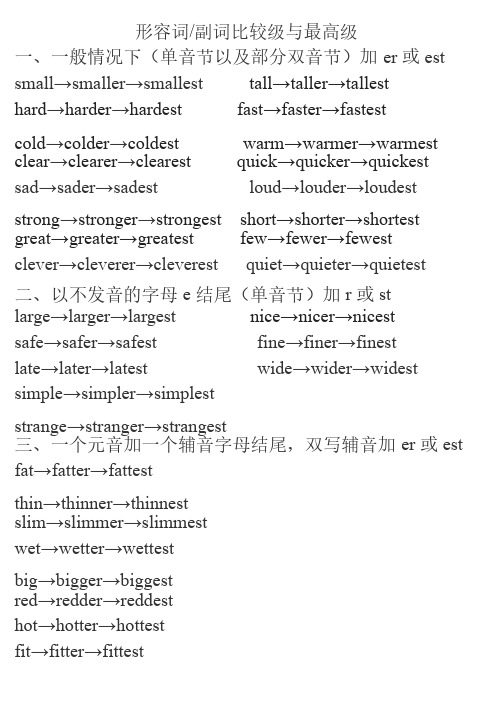
形容词/副词比较级与最高级一、一般情况下(单音节以及部分双音节)加er或est small→smaller→smallest tall→taller→tallesthard→harder→hardest fast→faster→fastest cold→colder→coldest warm→warmer→warmest clear→clearer→clearest quick→quicker→quickest sad→sad er→sadest loud→louder→loudest strong→stronger→strongest short→shorter→shortest great→greater→greatest few→fewer→fewest clever→cleverer→cleverest quiet→quieter→quietest 二、以不发音的字母e结尾(单音节)加r或st large→larger→largest nice→nicer→nicestsafe→safer→safest fine→finer→finest late→later→latest wide→wider→widest simple→simpler→simplest strange→stranger→strangest 三、一个元音加一个辅音字母结尾,双写辅音加er或est fat→fatter→fattest thin→thinner→thinnest slim→slimmer→slimmest wet→wetter→wettest big→bigger→biggest red→redder→reddest hot→hotter→hottestfit→fitter→fittest 四、辅音字母加y结尾,变y为i加er或est easy→easier→easiest angry→angrier→angriest busy→busier→busiest heavy→heavier→heaviest hungry→hungrier→hungriest crazy→crazier→craziest happy→happier→happiest early→earlier→earliest dirty→dirtier→dirtiest lucky→luckier→luckiestshy→shier→shiest funny→funnier→funniest lovely→lovelier→loveliest friendly→friendlier→friendliest 五、双音节以及多音节词前加more或most outgoing→more outgoing→most outgoing beautiful→more beautiful→most beautifuldifferent→more different→most differentquietly→more quietly→most quietly loudly→more loudly→most loudly slowly→more slowly→mo st slowly quickly→more quickly→mo st quickly sadly→more sadly→mo st sadly happily→more happily→mo st happily carefully→more carefully→mo st carefully serious→more serious→most serious →mo st similar similar→more similar→moeasily easily→more easily→most e asily clearly→more clearly→mo st clearly bored→more bored→mo st bored talented→more talented→mo st talented boring→more boring→mo st boring →mo st popular popular→more popular→moterrible→more terrible→mo st terrible delicious→more delicious→mo st delicious →mo st different different→more different→mo→mo st difficult difficult→more difficult→mo→mo st beautiful beautiful→more beautiful→moexpensive→more expensive→mo st expensive necessary→more necessary→mo st necessary →mo st important important→more important→mo→mo st wonderful wonderful→more wonderful→mocomfortable→more comfortable→mo st comfortable hardworking→more hardworking→mo st hardworking 不规则adj、adv比较级、最高级good/well→better→best bad/badly/ill→worse→worst many/much→more→most few/little→less→least old→older/elder→oldest/eldest far→farther/further→farthest/furthest 无比较级的adj/adv fantastic excellent favorite true(ly) false right wrong full empty round square possible impossible 。
- 1、下载文档前请自行甄别文档内容的完整性,平台不提供额外的编辑、内容补充、找答案等附加服务。
- 2、"仅部分预览"的文档,不可在线预览部分如存在完整性等问题,可反馈申请退款(可完整预览的文档不适用该条件!)。
- 3、如文档侵犯您的权益,请联系客服反馈,我们会尽快为您处理(人工客服工作时间:9:00-18:30)。
形容词,副词的比较级和最高级形容词:用来修饰名词,表示人或事物的特征,在句中可以做定语,表语,宾语补足语。
1 He has a new look.( 定语)2放于系动词,BE 动词后,作表语(be,look,taste,sound ,feel,smell,keep,get,turn,become,)That sounds interesting(表语)3 He often makes us happy( 宾补)副词:用来修饰动词,形容词,或其他副词,做状语。
1 She works hard.2 I am very busy.3 He runs too quickly.形容词变为副词的方法1一般在形容词的词尾加-ly可以变成副词。
quick—quickly, slow—slowly,2 一些以“辅音字母+y”结尾的形容词,要把y改为i再加-ly。
happy—happily, lucky—luckily, heavy—heavily,3 有些以-ble或-le结尾的形容词,去掉e加-y。
4. 少数以e结尾的形容词,要去掉e再加-ly。
特殊记忆true—truly。
大多数以e结尾的形容词仍然直接加-ly。
polite—politely, wide—widely等。
5. 以-l结尾的形容词变为副词时仍然要在词尾加-ly,usual—usually, careful—carefully, useful—usefully,除非是以-ll结尾的才在词尾只加-y :full—fully。
形容词,副词的比较级最高级规则变化1、一般直接在词尾加er; est :tall—taller--tallest light—lighter--lightest2、以字母e结尾的直接加r; st: nice—nicer—nicest fine—finer—finest3、以辅音字母加y结尾的形容词,要变y为i再加er; estheavy—heavier—heaviest busy—busier--busiest4、以重读闭音节结尾且末尾只有一个辅音字母的形容词,要双写末尾的辅音字母再加er; est eg: thin—thinner--thinnesthot—hotter—hottest big—bigger—biggest5、多音节形容词或部分双音节形容词变比较级在前面加more,最高级在前加mosteg: beautiful—more beautiful—most beautifulimportant—more important—most beautiful注:older 一般指年龄大小;eg: My father is older than my mother.elder指长幼关系(一般修饰名词作定语);eg: My elder brother is a driver.farther指距离更远;further指抽像的. eg: I want to study English further.形容词比较级的用法1、两者之间的比较,句中有明显的标志词thaneg: Tom is taller than John2、Which/Who is + 比较级, A or B ?eg: Which is easier, maths or English?3、能修饰比较级的副词及短:much(…的多)、a lot(…的多)、even(更…)、still(更…)、a bit(…一点儿) a littleThis city is much more beautiful than that oneToday is even hotter than yesterday.*4、… is the +比较级+ of the two.Tom is the taller of the two boys. 汤姆是这两个男孩中最高的5、…数量+ 比较级than …My father is three years older than my mother.6、比较级+ and + 比较级,“越来越…”Now it is hotter and hotter. 现在越来越热7、The + 比较级…,the + 比较级… “越…,就越…”The more , the better. 越多越好。
The more you eat, the fatter you will become.你吃得越多,你就越容易变胖形容词原级的用法1、very、so、quite、too等词后用原级2、too … to ; so … that ;as … as 中间用原级3 A + be + not as/so + 形副原级+ as B A不如B…The classroom was not (so)as clean as usual.教室没有平时干净4 A+beas+形副原级+asBA和B一样I think English is as important as math. 我认为英语和数学一样重要。
形容词最高级的用法1、the+最高级+ of/in (三者及以上范围的)eg: My mother is the busiest in my family2、one of the + 最高级+ 名词复数+ in/ofeg: Shenzhen is one of the biggest cities in China3、the + 序数词+ 最高级+ 名词+ in/ofeg: The Yellow River is the second longest river in China4、Which/Who is the + 最高级,A ,B or C ?eg: Which is the biggest , the moon, the earth or the sun ?比较级、最高级练习一、写出以下各形容词的比较级和最高级:1. nice ______________________2. fat ____________________3. slow _____________________ 4. dry ____________________5. happy ____________________6. wet ____________________7. much ____________________ 8. ill _____________________9. little _____________________ 10. bad ___________________11. thin ______________________ 12. far ____________________13. early _____________________ 14. careful_________________15. exciting ___________________二、根据句意,用所括号内所级形容词的比较等级形式填空:1. Bob is _________ ( young ) than Fred but ___________ (tall) than Fred.2. Yingtian is not as ___________ (tall) as Yongxian.3. Almost all the students' faces are the same but Li Deming looks _______(fat) than before .4.Which is _________ (heavy), a hen or a chicken?5.-- How _________ (tall) is Sally?-- She' s 1.55 metres ________ (tall). What about Xiaoling?-- She' s only 1.40 metres ________(tall). She is much _______(short) than Sally.She is also the _______ (short) girl in the class.6. He is ______ (bad) at learning maths. He is much _______ (bad) at Chinese and he is the_________ (bad) at English.7. Annie says Sally is the ________ (kind) person in the world.8.He is one of the_______ __(friendly) people in the class, I think.9. A dictionary is much (expensive) than a story-book.11. The Changjiang River is the _______ (long) river in China.12. Sue is a little _________ __ (beautiful) than her sister.13.My room is not as14.--How difficult is physics? --I' m not sure.-- Is it ________ (difficult) than maths? -- I don' t think so.-- Sue plays it _____ (well) than Annie. And Sally plays it the _______(well).16. Saturday is my _________ (busy) day in a week.17. Her mother is getting ____________(fat) and ________ (fat).18. I think it' s too expensive. I' d like a _____________ (cheap) one.19. He comes to school much ____________ (early) than I.20.This book is not as _____________ (interesting) as that one.21. Your classroom is __________(wide) and ___________(bright) than ours.22. Practise as __________ (much) as you can.23. The ________ (much), the ____________ (good).24. Nowadays(现在) English is ________ ( important ) than any other subject.25. Most of the students think a lion _____ ___(dangerous) than a bear and it is the _______ ___ (dangerous) animal in the world.27. Winter is _________ season of the years. (cold)28.This radio is not so ________ as that one. (cheap)29. It is much _______ today than yesterday. (hot)30. She is a little ____ ____ than her classmates. (careful)31. ________ people came to the meeting than last time. (many)32. Which book is ________, this one or that one? (easy)33. My room is _______ than yours. (small)34. Hainan is _______ from Beijing than Hunan. (far)35. Skating is ____ ___ than swimming. (exciting)36. Jim is ____ ___ than all the others. (honest)37. Things are getting _______ and _______. (bad)38. The higher you climb, the _______ it will be. (cold)39. Now his life is becoming ________ and _____ __. (difficult)40. There are _______ boys than girls in our class. (few)。
